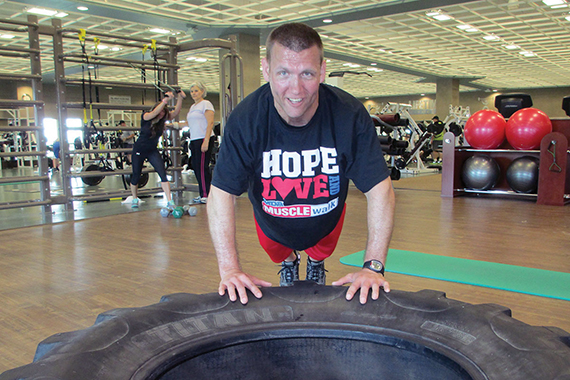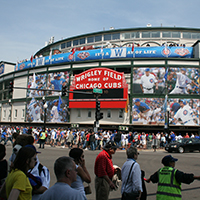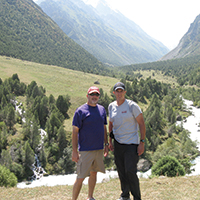 To learn more about Rob Besecker's trials and triumphs and how to order his book, For Ever Strong, visit www.robbesecker.com. (Photo provided)
To learn more about Rob Besecker's trials and triumphs and how to order his book, For Ever Strong, visit www.robbesecker.com. (Photo provided)
Heart Matters
Alum thrives and inspires in spite of severe medical obstacles
In 2003, not long after Rob Besecker (MBA ’02) graduated from Purdue, doctors urged him to begin writing about the newly placed pacemaker and defibrillator in his chest. A former scholarship baseball player in his undergraduate days at the Illinois Institute of Technology, Besecker seemed the very picture of health — young, strong and athletic. His heart, however, happen to beat otherwise: first slightly irregularly and at times almost completely out of control.
Fast forward a dozen years that featured a muscular dystrophy diagnosis in 2006; five cardiac-related surgeries, six ambulance rides and seven emergency room visits (in 2011 alone); as well as the death of his brother and both his parents. That journey, fraught with literal and figurative heartache, has led to his memoir, For Ever Strong, which should be released late in 2015.
Three words chosen carefully, Besecker explains the book title as “For” because he turned 40 in 2014, “Ever” for his quest to be part of a Mount Everest hiking expedition and “Strong” for his proactive approach to life.
Tough row to hoe
Often asked how he handles such potentially devastating health obstacles, Besecker offers: “What other options do I have? You can deal with it or you can be completely surrounded by it and go into a very dark place. I’ve certainly had my struggles, especially emotionally. But your choices are essentially to give up or keep moving. I chose to keep moving.”
That near constant movement has taken him on a career path from aviation and high-tech manufacturing to pharmaceutical sales to hospice care. For the last eight years, he’s led marketing and business development efforts in the south region for Advocate Health Care, educating health professionals and the community at large about end-of-life care.
The job brought Besecker back to his Chicago roots. “I was blessed with the opportunity to care for both my parents at the end of their respective lives,” he says. “Working with Advocate Hospice, I helped them find the best level of care available. I stayed with my dad at the end of his life and had my mom move into my home for the end of her life.”
Well aware of the fragility of life, Besecker encourages physicians and health care workers to be mindful that everyone is unique. “There’s so much that hospice offers,” he says. “Some people look at it as just giving up, but it’s not that at all. You’re changing the focus from a health condition to living your life to the fullest.”
30 stadiums, seven continents, one mountain
For Besecker, the fullest life has meant achieving very concrete and ambitious goals. He’s set foot on all seven continents, seen the Great Pyramids and the Great Wall of China and put his body through various warrior runs and fitness tests. In August 2014, after taking in a Seattle Mariners game at Safeco Field, this former catcher crossed off his goal of seeing a game in all 30 Major League Baseball stadiums. His favorite: Wrigley Field, he says, for all its nostalgic hometown appeal. The most lackluster: Tampa Bay’s Tropicana Field.
In 2012, when Besecker first talked about his desire to hike to the base camp of Mount Everest, his doctor unequivocally forbade it. When pressed for what he needed to do to get clearance, the doctor replied, “Let’s start off by having a year with no surgeries and we’ll go from there.”
Surgery-free in 2012, Besecker began building his body again for the Everest hike. This April, as his group reached the base camp, they were greeted by the devastating Nepal earthquake, which killed more than 9,000 people and injured more than 23,000.
Besecker’s group was largely unharmed, though he was separated from his sister, Chris Griffin, who fractured three ribs and had to be medically evacuated because of altitude sickness. “Call it dumb luck or divine intervention, but we were very fortunate. We did not get seriously hurt,” he says. “With my background in hospice I was probably as prepared as I could be for some of the death and destruction I witnessed out there.”
A personal accomplishment overshadowed by the sheer tragedy of the Nepal earthquake will forever affect Besecker. He witnessed many people who stepped up in the catastrophe and could surely relate to their survival instincts. Their stories, now linked to his, are the opening passages of For Ever Strong.
Besecker embraces the role of storyteller, often sharing his story in classrooms with professional groups and at Muscular Dystrophy Association events. His biggest honor, however, is his forthcoming keynote speaker role at an implantable cardioverter defibrillator meeting in November. Whatever life holds from him, he’s sure to take it head on, bold and strong, with his heart fully invested.








